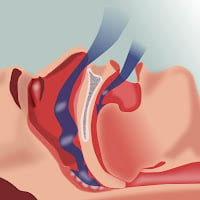The study is published in the medical journal Neurology.
Tau is a protein found in neurons and the protein can form into tangles. These accumulate in the brains of people with Alzheimer’s disease. This accumulation can start decades before symptoms of the disease appear. Previous studies of older adults have suggested that sleep deprivation can increase the level of tau in the cerebral spinal fluid. Trauma to the head can also increase circulating concentrations of tau in blood.
Sleep Disruption & Tau

“Many of us experience sleep deprivation at some point in our lives due to jet lag, pulling an all-nighter to complete a project, or because of shift work, working overnights or inconsistent hours,” said study author Jonathan Cedernaes, MD, PhD, from Uppsala University in Sweden. “Our exploratory study shows that even in young, healthy individuals, missing one night of sleep results in a slight increase in the level of tau in blood. This suggests that over time, similar types of sleep disruption could potentially have detrimental effects.”
The study involved 15 healthy, normal-weight men with an average age of 22. They all reported regularly getting seven to nine hours of quality sleep per night.
Dementia Books & Videos on Amazon:
FREE Newsletter:
Two Phases to the Study
There were two phases to the study. For each phase, the men were observed under a strict meal and activity schedule in a sleep clinic for two days and nights. Blood samples were taken in the evening and again in the morning. For one phase, participants were allowed to get a good night of sleep both nights. For the other phase, participants were allowed to get a good night of sleep the first night followed by a second night of sleep deprivation. During sleep deprivation, lights were kept on while participants sat up in bed playing games, watching movies or talking.
Researchers found that the men had an average 17-percent increase in tau levels in their blood after a night of sleep deprivation compared to an average 2-percent increase in tau levels after a good night of sleep.
Researchers also looked at four other biomarkers associated with Alzheimer’s but there were no changes in levels between a good night of sleep and one night of no sleep.
“It’s important to note that while accumulation of tau in the brain is not good, in the context of sleep loss, we do not know what higher levels of tau in blood represent” said Cedernaes. “When neurons are active, release of tau in the brain is increased. Higher levels in the blood may reflect that these tau proteins are being cleared from the brain or they may reflect an overall elevation of the concentration of tau levels in the brain.
“Future studies are needed to investigate this further, as well as to determine how long these changes in tau last, and to determine whether changes in tau in blood reflects a mechanism by which recurrent exposure to restricted, disrupted or irregular sleep may increase the risk of dementia,” he said. “Such studies could provide key insight into whether interventions targeting sleep should begin at an early age to reduce a person’s risk of developing dementia or Alzheimer’s disease.”
The main limitation of the study was its small size. In addition, it looked only at healthy young men, so the results may not be the same for women or older people.
SOURCE:
REFERENCE:
- Christian Benedict, Kaj Blennow, Henrik Zetterberg, Jonathan Cedernaes.Effects of acute sleep loss on diurnal plasma dynamics of CNS health biomarkers in young men. Neurology 2020; 10.1212/WNL.0000000000008866 DOI: 10.1212/WNL.0000000000008866











